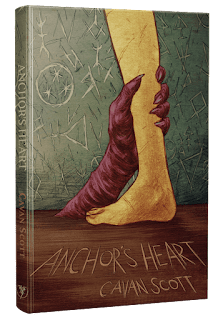hammer, Transformers, Assassin’s Creed, Sherlock Holmes and the Teen Titans. He was even credited, in the most recent issue of Empire magazine I read, for inspiring an upcoming Star Wars television series. This novella, however, is set in a universe of his own creation, and it’s rather a glum place.
Mark Poole is a paramedic who after seven years on the job took a call that left him seriously traumatised. He wasn’t responsible for the death, but that only seems to have made it worse. If he had messed up, he could learn to do better next time, but the inevitability of such moments, of turning up to find dead bodies, of how often it happened during the pandemic, was too much for him. And now four months later he’s staying home, helping Beryl from the downstairs apartment with her gardening. He starts to hear music no one else can hear, has visions of disturbingly erotic artwork, and becomes convinced that someone in the house next door needs his help.
I didn’t enjoy this book as much as I had hoped, given the excellent track record of PS Publishing when it comes to novellas. (Absinthe Books is a boutique PS Publishing imprint run by Marie O’Regan, who also provides a brief introduction to the book.) It isn’t terrible, but for me it didn’t rise above being a three-star book, a readable enough slice of horror that never really takes off. Part of the problem is that it’s told in the first person present tense, and Mark isn’t a very interesting narrator. His phrasing is quite humdrum (“The most I know about him is that his car is an absolute beauty”) and when describing sexual stuff his language can be off-puttingly pornified. He frequently uses short one-sentence paragraphs for dramatic effect and they tend to fall flat.
Another problem for me was that although Mark is obviously not in his right mind during the events of the story, his actions often beggar belief. As a health worker, he would have been on as many safeguarding courses as any of us. Despite the supernatural elements, he should have known perfectly well how best to go about raising the alarm over what he believes to be a mistreated child. The lack of consequences for his actions also bothered me. For example, at one point he persuades his sister, a GP, to access a patient’s medical records, with serious consequences for the patient, but none for Mark or his sister.
But the book does have its strengths. It’s very good at conveying Mark’s mounting frustration, and the reader can only share his distress as things get worse for him rather than better. It realistically portrays the way his relationships (with Beryl, Jason in the apartment upstairs, and his sister) crumble under the pressure of his obsession with the house next door. The short, intense chapters encourage the reader to share his sense of panic, since there’s never enough time in them for anything to be fixed. And the book’s revelations end up being not quite what one expects. Dedicated horror fans may find that it provides a satisfying enough portion of what they want from a book. Stephen Theaker ***
This review originally appeared on the previous version of the British Fantasy Society's website, and then in Theaker's Quarterly Fiction #72. The book is available in signed and unsigned editions from PS Publishing.


No comments:
Post a Comment